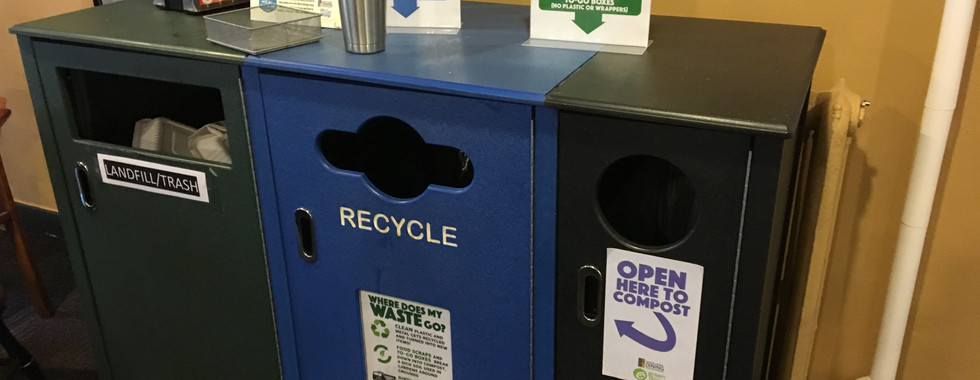It is becoming increasingly important for us to divert our waste away from landfills by either recycling or composting. Composting your food scraps is an easy and cheap way to reduce the amount of waste send to landfills.
The first step to eliminating food waste should be buying and cooking less. Try to plan out . your meals during each grocery shopping trip, or put less on your plate to make sure you are able to eat everything you take. The second step is to donate your excess (edible, untouched, and sanitary) food to a local food bank or charity. Excess food or food scraps that cannot be donated should be composted.

Why Compost?
According to the EPA, in 2015, more than 39 million tons of food waste was generated, and only 5.3% of that waste was diverted from the landfills. They also estimate that food waste makes up 22% of the total solid municipal waste in landfills (1). When food waste is sent to landfills, it can't decompose properly due to lack of oxygen. This causes the food waste to release greenhouse gases such as methane, which contributes to our warming climate. It is also a waste of nutrients; nutrients still locked inside food scraps should be recycled back into the soil and ecosystem through compost.
How to Compost
There are a few ways you could go about composting your food scraps.
1. Students at UVA have access to a few composting bins around grounds. These bins are located at West Range, Fine Arts Cafe, and The Castle. Each of these bins takes food scraps, compostable to-go boxes from the dining halls, unlined coffee cups (unlined coffee cups do not contain plastic), cardboard, compostable plastic cups (these are available at the Castle), and various paper products. The bins include signs with more details on exactly what can be composted. UVA dining is in partnership with the Black Bear Composting company, which is a composting and organics recycling company that helps businesses and people reduce their waste by turning it into nutrient-rich soil. Check them out here.
Composting locations: The Castle, West Range, Fine Arts Cafe
2. Many students live in apartments, which makes accessing these bins much more difficult. Luckily, these are other opportunities to compost. The City of Charlottesville has drop-off locations for compost at the City Market, which is Charlottesville's weekly farmer's market happening every Saturday from 8am-12pm from April to December. The City also has a compost pilot program. If you sign up for the program, you are assigned to a locked composting bin around the City, and are given a code to access the bin. This is a very new program and Charlottesville is hoping to expand it as more people participate. To Subscribe: contact composting@charlottesville.org or call 434-970-3830, and give them your name, address, phone number, and email address. McIntire Recycling Center also has a compost drop-off service, provided by the Rivanna Solid Waste Authority. These locations also partner with Black Bear Composting, so they can accept the same kinds of materials as the UVA Dining composting bins. These options are mostly the most convenient for older students who may live off-grounds.
3. Another composting option for those who have the space to do it, is to start a composting bin either in your apartment or in a backyard.
One type of composting bin is a worm bin. The worms decompose the food scraps into a rich, dark soil. Building a worm bin involves buying a container with holes to allow water flow and ventilation, buying worms, and buying (or finding) soil. Once you have the container, line the bottom with wet strips of old paper product such as newspaper or notebook paper. Place a layer of soil over the paper, and place the worms on top of the soil. The more worms, the better; if you have too few worms they will not be able to decompose the food scraps before they start to rot. Your worm bin is now set up: start placing food scraps on top of the worms, layering it with wet paper strips. This article describes these steps in slightly more detail. A worm bin is ideal for apartments or for those with limited space.
If you have a backyard, you can make a larger compost pile without buying worms by layering grass clippings, leaves, twigs, and food scraps. Check out this cool flyer from the City of Charlottesville to learn more about backyard compost and their other services.
Compost bins will take an initial investment and some work, but if you truly care about decreasing your waste and environmental impact, building a compost pile or dropping off compost at specified locations will be worth the effort.

I encourage you to research the importance of composting, and how to do it, on your own. Also, these ideas don't have to just apply to student life; bring these ideas home to your families and spread them around to your friends. The more people that start composting, the more normal it will become, and the more waste we can divert from landfills.
If you’re interested in learning more about UVA Green Dining’s sustainability initiatives, check out this link: https://virginia.campusdish.com/en/Sustainability/WhatWeAreDoing

References:






